Related Research Articles

Daniel Defoe was an English novelist, journalist, merchant, pamphleteer and spy. He is most famous for his novel Robinson Crusoe, published in 1719, which is claimed to be second only to the Bible in its number of translations. He has been seen as one of the earliest proponents of the English novel, and helped to popularise the form in Britain with others such as Aphra Behn and Samuel Richardson. Defoe wrote many political tracts, was often in trouble with the authorities, and spent a period in prison. Intellectuals and political leaders paid attention to his fresh ideas and sometimes consulted him.

Robinson Crusoe is an English adventure novel by Daniel Defoe, first published on 25 April 1719. Written with a combination of Epistolary, confessional, and didactic forms, the book follows the title character after he is cast away and spends 28 years on a remote tropical desert island near the coasts of Venezuela and Trinidad, encountering cannibals, captives, and mutineers before being rescued. The story has been thought to be based on the life of Alexander Selkirk, a Scottish castaway who lived for four years on a Pacific island called "Más a Tierra" which was renamed Robinson Crusoe Island in 1966. Pedro Serrano is another real-life castaway whose story might have inspired the novel.
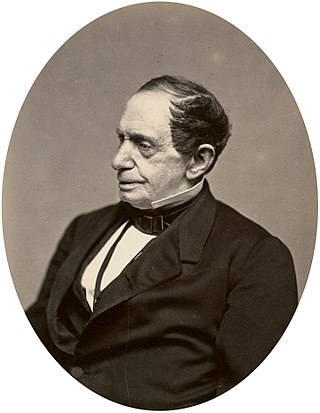
Johns Hopkins was an American merchant, investor, and philanthropist. Born on a plantation, he left his home to start a career at the age of 17, and settled in Baltimore, Maryland, where he remained for most of his life.
This article contains information about the literary events and publications of 1715.

Anna Seward was an English Romantic poet, often called the Swan of Lichfield. She benefited from her father's progressive views on female education.
John Robert Moore (1890–1973) was an American biographer and bibliographer of Daniel Defoe.
Captain Charles Johnson was the British author of the 1724 book A General History of the Robberies and Murders of the most notorious Pyrates, whose identity remains a mystery. No record exists of a captain by this name, and "Captain Charles Johnson" is generally considered a pen name for one of London's writer-publishers. Some scholars have suggested that the author was actually Daniel Defoe, but this is disputed.
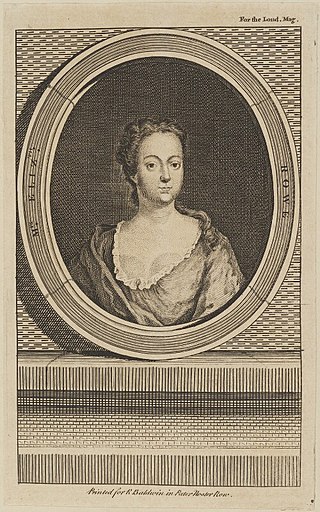
Elizabeth Singer Rowe was an English poet, essayist and fiction writer called "the ornament of her sex and age" and the "Heavenly Singer". She was among 18th-century England's most widely read authors. She wrote mainly religious poetry, but her best-known work, Friendship in Death (1728), is a Jansenist miscellany of imaginary letters from the dead to the living. Despite a posthumous reputation as a pious, bereaved recluse, Rowe corresponded widely and was involved in local concerns at Frome in her native Somerset. She remained popular into the 19th century on both sides of the Atlantic and in translation. Though little read today, scholars have called her stylistically and thematically radical for her time.

"Michael" is a pastoral poem, written by William Wordsworth and first published in the 1800 edition of Lyrical Ballads, a series of poems that were said to have begun the English Romantic movement in literature. The poem is one of Wordsworth's best-known poems and the subject of much critical literature. It tells the story of an ageing shepherd, Michael, his wife Isabel, and his only child Luke.
Wilfred Whitten (1864–1942) was a British writer and editor. His pseudonym was "John O'London", from where the influential John O'London's Weekly obtained its name.

The Shortest Way with the Dissenters; Or, Proposals for the Establishment of the Church is a pamphlet written by Daniel Defoe, first published anonymously in 1702. Defoe was prompted to write the pamphlet by the increased hostility towards Dissenters in the wake of the accession of Queen Anne to the throne.

James Stanier Clarke (1766–1834) was an English cleric, naval author and man of letters. He became librarian in 1799 to George, Prince of Wales.
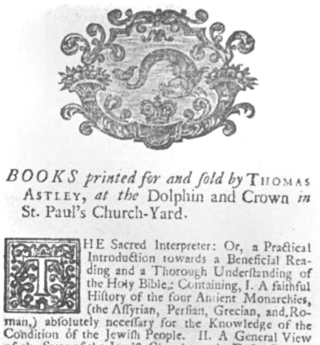
Thomas Astley was a bookseller and publisher in London in the 18th century. He often wrote about relevant topics at the time, and contributed to many of those controversial topics. He ran his business from Saint Paul's Churchyard and Paternoster Row. He belonged to the Company of Stationers. He published the celebrated Voyages and Travels which described localities in Africa and Asia, compiling information from travel books by John Atkins, Jean Barbot, Willem Bosman, Theodor de Bry, Francis Moore, Jean-Baptiste Labat, Godefroi Loyer, Thomas Phillips, William Smith, and Nicolas Villaut de Bellefond. It included engravings by G. Child and Nathaniel Parr. Astley intended his Voyages to improve upon the previous travel collections of Samuel Purchas, John Harris, and Awnsham & John Churchill. It was read by patrons of Hookham's Circulating Library, Boosey's circulating library, London Institution, Royal Institution, Salem Athenaeum, and Cape Town public library. Astley's Voyages was translated into German (Schwabe, Allgemeine Historie der Reisen, Leipzig) and French (Prévost, Histoire des voyages, Paris).
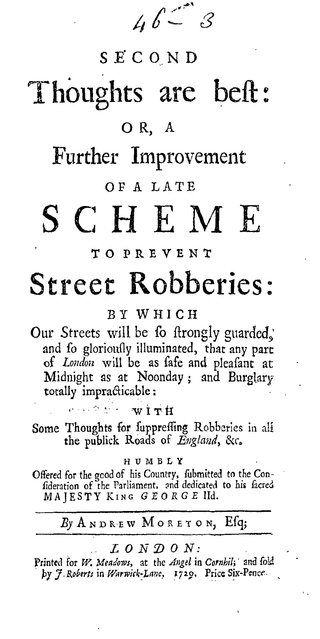
Second Thoughts Are Best: or, a Further Improvement of a Late Scheme to Prevent Street Robberies is a 1729 pamphlet by Daniel Defoe. He wrote it under the name of Andrew Moreton Esq., presented as a dissatisfied middle-class old man who was extremely concerned about the increase in criminality around the 1720s.
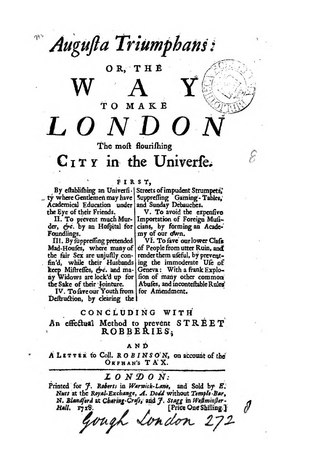
Augusta Triumphans: or, the Way to Make London the Most Flourishing City in the Universe by Daniel Defoe was first published on 16 March 1728. The fictitious speaker of this pamphlet, Andrew Moreton, is a man in his sixties who offers suggestions for the improvement of London. In particular, he fosters the establishment of a university, an academy of music, a hospital for foundlings and licensed institutions for the treatment of mental diseases. Moreover, he encourages the introduction of measures to prevent moral corruption and street robbery.
Andrew Moreton is a pseudonym used by Daniel Defoe in several pamphlets published between 1725 and 1729, proposing some new reflections on themes already discussed in Defoe's 1697 An essay upon projects. Moreton is presented as a crotchety middle-class old gentleman complaining about the indecency of London social life in the latest years. Fulfilling his duty as an honest and concerned citizen, Moreton firmly advances possible reforms in order to improve the quality of life of all social classes.
Parochial Tyranny: Or, the House-Keeper's Complaint Against the Insupportable Exactions, and Partial Assessments of Select Vestries, &C is a 1727 pamphlet by Daniel Defoe. It deals with the corruption of parishes. Similarly to Every-body's Business, Is No-body's Business (1725), The Protestant Monastery (1726), Augusta Triumphans (1728) and Second Thoughts are Best (1729), it was published under the pseudonym of Andrew Moreton. Defoe did not sign his name to the majority of his works. He preferred them to be published anonymously or under one of his pen names. This choice was “sometimes” made “to conceal his authorship or to stimulate sales, but more characteristically to establish a point of view”.
Everybody's Business is Nobody's Business: Or, Private Abuses, Public Grievances Exemplified is a 1725 pamphlet by Daniel Defoe. It deals with the "exorbitant Wages of our Women, Servants, Footmen". Similarly to The Protestant Monastery (1726), Parochial Tyranny (1727), Augusta Triumphans (1728) and Second Thoughts are Best (1729), it was published under the pseudonym of Andrew Moreton. Defoe did not sign his name to the majority of his works. He preferred them to be published anonymously or under one of his pen names. This choice was “sometimes” made “to conceal his authorship or to stimulate sales, but more characteristically to establish a point of view”.
An Essay Upon Projects (1697) was the first volume published by Daniel Defoe. It begins with an introduction containing a portrait of his time as a "Projecting Age", and subsequently illustrates plans for the economic and social improvement of England, including an early proposal for a national insurance scheme.
The Great Law of Subordination Consider'd; Or, the Insolence and Unsufferable Behaviour of SERVANTS in England Duly Enquired is a 1724 pamphlet by Daniel Defoe. Similarly to Every-body's Business, Is No-body's Business (1725), it focuses on issues related to servants. It also revises themes which its author had already dealt with in An Essay Upon Projects (1697).
References
- 1 2 P B, Backscheider (1989). Daniel Defoe.His Life. Baltimore and London: The Johns Hopkins University Press. p. 517.
- ↑ J, Richetti (2008). The Cambridge Companion to Daniel Defoe. New York: Cambridge University Press. p. 40.
- 1 2 3 J R, Moore (1971). "Defoe's Persona as Author: The Quaker's Sermon". SEL: Studies in English Literature 1500–1900. 11 (3). Rice University: 507–516. doi:10.2307/449910. JSTOR 449910.